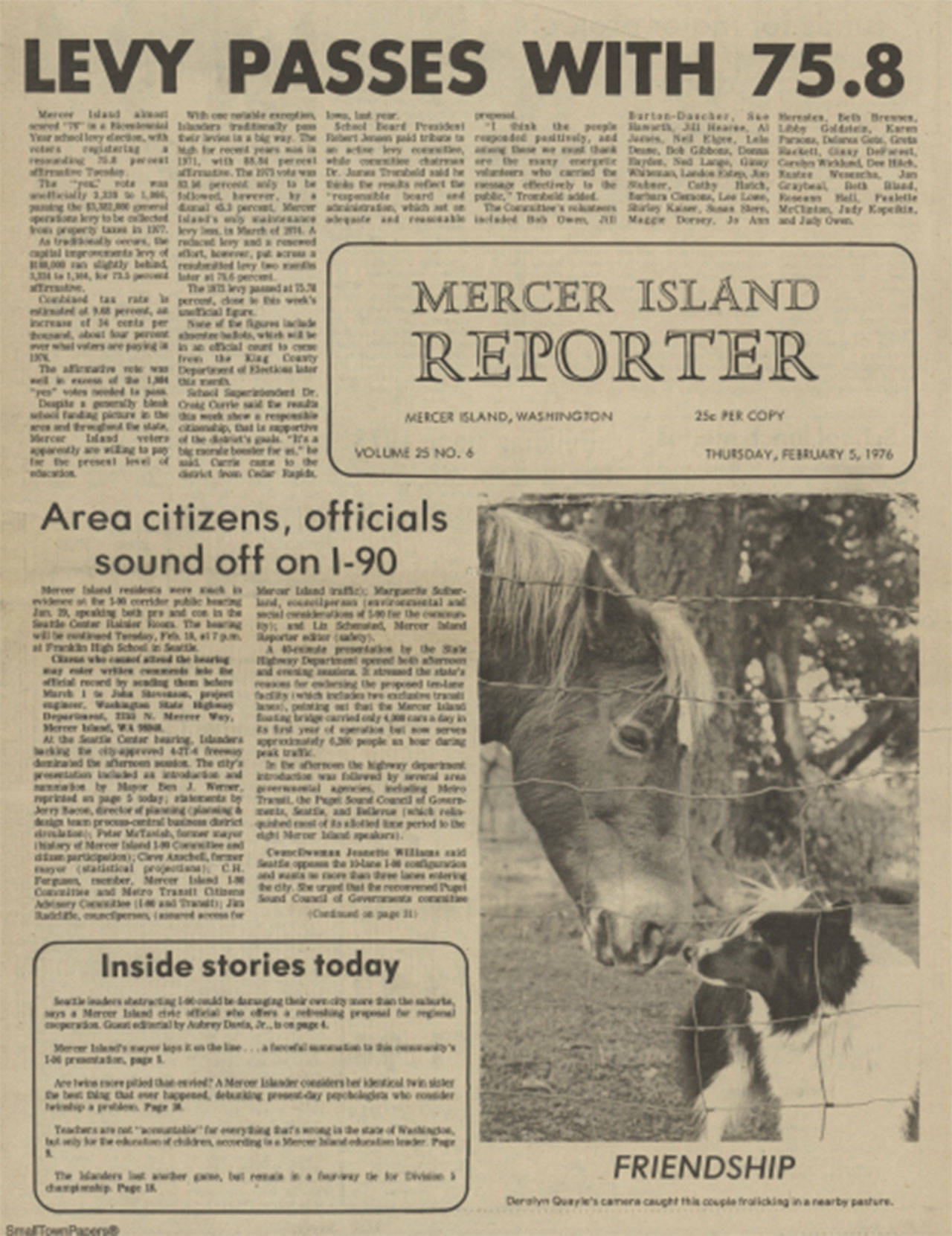Mercer Island Historical Society co-chairs Terry Moreman and Jane Meyer Brahm are hoping to raise the profile of the group this year by improving the website, doing presentations for Island students and pouring energy into a new project: digitizing the archives of the Mercer Island Reporter.
At the moment, the physical copies of the Reporter are being stored in a warehouse in Kirkland. Searching for information can be difficult unless the exact date of publication is known. But that’s about to change.
Brahm and Moreman have contracted with a company, SmallTownPapers, Inc, that digitizes newspaper archives, making them not only accessible online, but searchable.
It’s “the first online newspaper archive repository dedicated to small town America,” according to its website.
Mercer Island Reporter issues from 1968, 1974, 1975, 1976, 1978, 2004 and 2005 have already been uploaded, and 1995, 1997, 1999 and 2000 are in the works. Access is free, but there is a fee to print out pages. See the archives at mih.stparchive.com.
The Historical Society is seeking donations and sponsorships to keep the project going. It costs about $1,000 to digitize one year of archives. The group has already received $3,000 from Cyclemates, and is seeking grants from the Mercer Island Community Fund, 4Culture and the local Rotary club. Individual donations are welcome. Brahm also suggested that Mercer Island High School classes could fund the digitization of papers from the year they graduated.
Brahm, who edited the Reporter, served on the City Council and wrote a Mercer Island history book, and Moreman, the former executive director of the Mercer Island Chamber of Commerce and the 2016 Citizen of the Year, are “career volunteers” who have lived on the Island for decades.
They took over when the past president-elect, Sally Brown, died suddenly. Then-president Susan Blake put the organization on a hiatus for a year, with no meetings or activities, while she considered the next step. She decided to step down as president, remaining on the board, and approached Brahm and Moreman about helping.
The main goal of the 501(c)(3) nonprofit organization, established in 1954, is to “collect, preserve, research, record, and make available the heritage of Mercer Island.“
To that end, the Historical Society has recently been partnering with the Mercer Island Library on programs like the “pick a pic” photo giveaway — which it is planning to repeat some time this spring — and guest lectures on local history.
The new co-chairs are hoping to get the next generation of Islanders involved.
“History is not just for old people,” Brahm said. “Mercer Island is a fascinating community with a fascinating history.”
See mercerislandhistory.org for more.
Coming 2018 Spring Events (presented in cooperation with the Mercer Island Library):
“Chief Seattle and the Town That Took His Name,” 3 p.m. on Feb. 11 at Aljoya
Many know that the city of Seattle was named after a prominent Suquamish and Duwamish chief. But there hasn’t been a thorough account of Chief Seattle and his times—until now. Join us to hear historian David Buerge share stories from his latest book, “Chief Seattle and the Town That Took His Name: The Change of Worlds for the Native People and Settlers on Puget Sound.” Buerge spent 20 years researching this book, drawing on oral histories from Duwamish, Suquamish, Muckleshoot and other tribe members and mined historical records, newspaper reporting, and pioneer diaries. He’ll share details of how Chief Seattle advocated for peace during a time of tremendous flux, and how his influence resonates to this day.
“The Pine and the Cherry: Japanese Americans in Washington,” 7 p.m. on March 7 at the library
Leading up to WWII, Japanese in Seattle and Eastern Washington thrived and prospered. Then came Executive Order 9066, forcing 120,000 Japanese and their American-citizen offspring to concentration camps, without due process. When they returned, most had lost everything and could not find jobs. How did they face this injustice and rebuild their lives? How does a lively immigrant community face racist or religious hatred? Mayumi Tsutakawa, whose father was renowned sculptor George Tsutakawa, will reveal her family’s 100-year history against the backdrop of this dramatic American story. This event is sponsored by the Friends of the Mercer Island Library and Humanities Washington Speakers Bureau.
“Bandanas to Badges: Songs and Stories of Northwest Workers,” 2 p.m. on April 21 at Aljoya
Acoustic trio Trillium-239 shares stories and songs of working life in the Northwest, beginning with American settlement of the West and ending with modern high-tech industries. Thoughtful music selections and interesting historical tidbits reflect the evolution of these workers’ experiences. This event is sponsored by the Friends of the Mercer Island Library and Humanities Washington Speakers Bureau.



